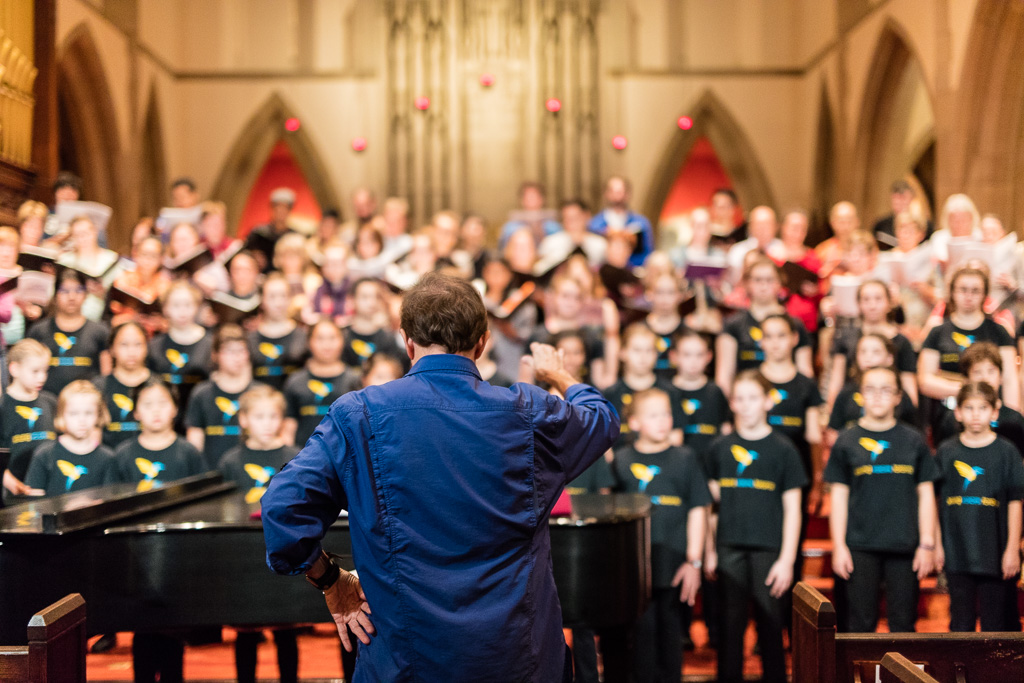When it was my turn to audition, an assistant in excessively formal dress ushered me into the room, low ceiling, dimly lit, walls covered in oak paneling. Positioned in the far corner, the accompanist sat at a grand piano and affected an air of indifference. In the corner closer to the entrance sat a large wooden desk and, behind it, the maestro himself. Immediately, I understood that the room’s arrangement was strategic: I would have to pass before the maestro in order to deliver the audition music to the accompanist and that would give the great man an opportunity to see how I moved in a performance situation. I confess that I felt awkward. I had stepped into the presence of one of the world’s most intimidating choral figures and it seemed to me that he could hear every breath I took and could even feel the motions of my diaphragm. He could descend to the cellular level and uncover the workings of my larynx.
I handed my copy of Samuel Barber’s “Sure On This Shining Night” and, in halting tones, announced what I’d be singing. Although I wanted to explain my choice—how I thought it was better to sing something simple with sustained notes (rather than something flashy and operatic) as a way to demonstrate my potential to blend with a choral ensemble—my voice teacher had advised against saying too much. She said it was disrespectful, especially when dealing with a man of the maestro’s stature, because a long and involved explanation implied that the man was stupid.
I nodded to the accompanist and started into it. While I can’t say that it was the best performance of my life, it was pretty damn close. Half way through, the maestro waved an arm and the accompanist stopped playing and I continued one note into the silence, hovering there like the coyote before he realizes he’s run off the cliff, and I waited to drop into the abyss.
Enough! the man shouted. Mr. Barker, you come into my presence today, asking if you can sing tenor in my choir. And you think because tenors are god’s chosen that I have no choice but to grovel and beg you to join the tenor section. But you have no respect. For years, you could have joined my choral family. But no. You wait until today. You come into this room and you don’t even kneel to kiss my ring.
At first, I thought that I had failed the audition. But the maestro paused and I took advantage of that instant to approach the great man, to abase myself before him, to kiss his ring and to ask him humbly, and with all respect, if I could become a member of his choral family.
The maestro urged me to my feet and said that he would be happy to have me join the tenor section. But remember, he said, one day—and that day may never come—I might need a favour, and I expect you to be ready to offer your services.
So began some of the most fulfilling years of my life. Not only was it musically rewarding to belong to the maestro’s choral family, but it was also socially stimulating. I developed many enduring friendships and I felt more connected to my community than I’d ever felt in years.
But I knew this couldn’t last. As I was beginning my 10th season with the choir, the maestro summoned me to his oak paneled office. It was time for him to call in his marker. He explained the situation. There was a soprano who was beginning to squawk like a parrot. For the last two years, he’d been able to mask the sound by cleverly positioning her with other voices. But this season, at the first rehearsal, he couldn’t help but hear that the parrot was sick and no amount of clever positioning would mask the sound. He had asked the soprano to leave. He had asked politely. He had asked respectfully. But no. She said the choir was her family and she wouldn’t abandon her family.
The maestro looked at me and said: I need you to make her an offer she can’t refuse.
At the next rehearsal, I showed up with a length of piano wire. It tends to be messy, but it makes a real statement, especially in the choral community when people see what it does to a windpipe. I realize one day I could suffer the same end, but let’s be realistic here. I’m a tenor, one of god’s chosen, whereas sopranos come through this place like there’s a revolving door.
